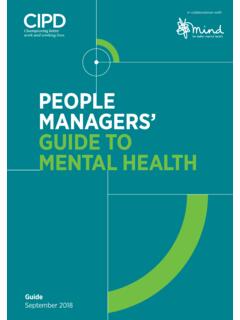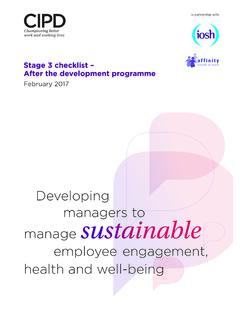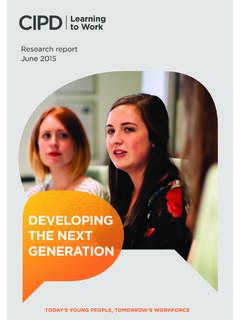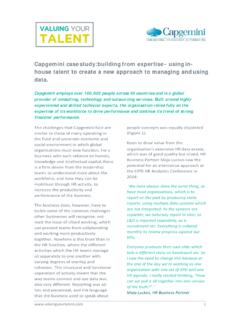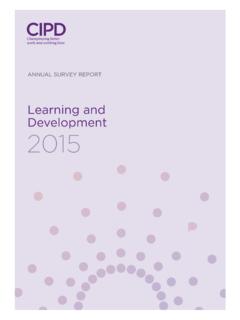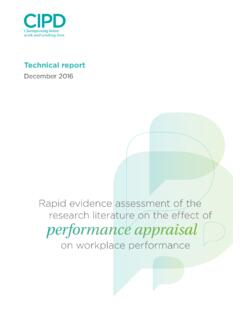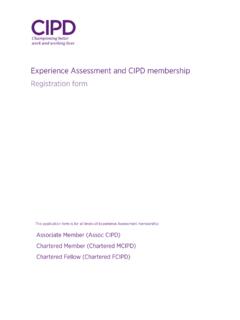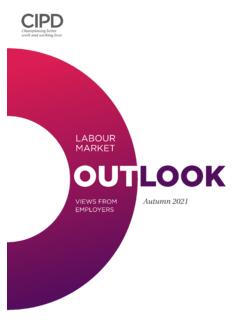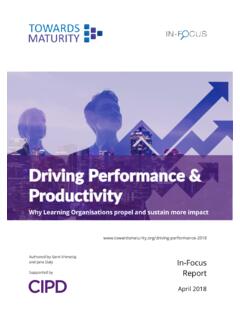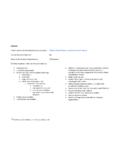Transcription of Manager support for return to work following long-term ...
1 Manager support for return to work following long -term sickness absence Guidance Manager support for return to work following long -term sickness absence : guidance What is long -term sickness absence ? long -term sickness absence is typically defined as four weeks or more continuous absence . Currently, the most prevalent conditions responsible for long -term absences are stress, anxiety and depression, back pain, coronary heart disease and cancer, with all of these predicted to increase in the years ahead. Why there is a need to tackle long - brings an increase in self-respect, self- term sickness absence esteem, mental well-being and social inclusion as well as financial stability and Organisational perspective: independence. sickness absence is a persistent problem for Failure to return to work has been linked to organisations and presents a major public poorer health outcomes for employees and health and economic concern. potential relapses into secondary cases of Dame Carol Black's 2008 review of the long -term sickness absence .
2 Health of Britain's working population, A timely, well-planned and well-executed Working for a healthier tomorrow, found return -to- work process will have substantial the economic costs of sickness absence and positive benefits for an employee's well . worklessness associated with working age being and rehabilitation and could also ill-health are over 100 billion a year. Her prevent potential relapses. report estimated that around 175 million working days were lost to illness in 2006. While there have been significant advances sickness absence costs employers in rehabilitation policies and return -to- work approximately 11 billion per year, with interventions, employees still continue to long -term sickness absence contributing up experience difficulties returning to work to 75% of absence costs. following long -term sickness absence . Line While long -term absences account for only managers play a crucial part in the return -to . 5% of absence episodes, these absences work process and in the health and well-being account for over 40% of the total working of their employees, so it is vitally important time lost.
3 That they be helped to manage the return -to . work process effectively. Employee perspective: It is now widely accepted that work is good for employee health and can help to reduce health inequalities. For employees, returning to work represents a return to a sense of normality, which 2. The importance of line managers What line Manager behaviours are important to support return to work ? Line managers are important in the return -to While practical workplace adjustments are work process for a number of reasons: welcomed by the employee, the behaviours line They are often the first contact point when the managers display when managing a returning employee is unwell and does not attend work . employee are vital for a successful return They are responsible for the day-to-day to work and to prevent relapse. A research management of the employee on their return . team from Goldsmiths University of London, They are key to work adjustments and Loughborough University and Affinity Health implementation of work redesign initiatives.
4 At work , funded by the British Occupational They may be the first person called upon by Health Research Foundation and supported by the employee when they need to meet HR/ the CIPD, the HSE and Healthy Working Lives occupational health (OH) for advice on their has been exploring this issue. condition and the return to work . Their behaviour can influence employees' The research aimed to identify both the positive exposure to workplace psychosocial hazards Manager behaviours needed and negative (for example work demands, control, and behaviours that should be avoided to bring so on) and these are likely to be felt more about an employee's successful return to keenly by those returning following a period work following long -term sickness absence away from the workplace. due to stress, anxiety and depression, back Their behaviour can cause employee stress pain, heart disease or cancer. A combined (or prevent additional stress), and stress qualitative and quantitative methodology or anxiety is likely to be felt more keenly was adopted, using a range of perspectives, by those returning following a period of to develop a Competency Framework for sickness absence .
5 Managers to support return to work . The flow diagram below outlines the research process Recent changes and the resultant Competency Framework The Government has recently introduced fit for Managers to support return to work is notes' to replace the old sick note' system provided on the following page. to encourage those on long -term sick leave to make an early return to work with the support of their organisation. GPs will be able to recommend that employees may be fit for work , providing that their advice on relevant action (usually in the form of practical support such as amended working hours or duties) is taken into account. This will put greater responsibility on line managers to provide appropriate support to employees to remove some of the challenges they may face when returning to work . Line managers may therefore require greater guidance from OH/HR. on how best to provide this support . 3. The research process STAGE 1. Identifying the Manager behaviours 5 workshops with HR and OH professionals and 46 interviews with managers and employees with experience of the return -to- work process.
6 Data analysed to identify themes and develop the preliminary Competency Framework for Managers to support return to work . STAGE 2. Developing the Competency Measure for Managers to support return to work Questionnaire developed drawing from the pool of management behaviours extracted from the focus groups and interviews in Stage 1. STAGE 3. Trial and refinement of the Competency Framework and Measure for Managers to support return to work Distribution of questionnaire to 186 managers and 359 employees. Analysis of the results and refinement of both the Competency Framework for Managers to support return to work and the Competency Measure for Managers to support return to work following factor analysis. STAGE 4. Follow-up survey Refined questionnaire sent back to the original employees and managers after a period of six months. Analysis to examine the reliability and validity of the competency framework and measure over time. 4. Competency Framework for Managers to support return to work Examples of Manager behaviour During the employee's absence , the Manager .
7 Regularly communicates with the individual via telephone or email regularly communicates work issues with the individual to keep them in the loop While the employee focuses conversations more on the individual's well-being is in touch with the individual's close colleagues with regards to their health encourages work colleagues and other members of the organisation to keep in is off touch with the individual relays positive messages through family or friends makes it clear that the individual should not rush back to work makes it clear that the company will support the individual during their absence reassures the individual that their job will be there for them when they return prevents the individual from pushing him/herself too much to return to work Once the employee has returned to work , the Manager . gives the individual lighter duties/different jobs during their initial return to work The initial return incorporates a phased return to work for the individual to work remains objective when discussing return -to- work adaptations for the individual explains the return -to- work process/procedures to the individual before they return explains any changes to the individual's role.
8 Responsibilities and work practices meets the individual on their first day back makes the individual's first weeks back at work as low-stress as possible loses patience with the individual when things become difficult behaviours Negative displays aggressive actions questions the individual's every move goes against the individual's requests for certain adjustments to be made to their work makes the individual feel like a nuisance for adding extra work to their schedule asks the individual's permission to keep the team informed on their condition Managing the team makes the individual feel like they were missed by the organisation encourages colleagues to help in the individual's rehabilitation process promotes a positive team spirit regularly communicates with HR/OH and keeps the individual informed is proactive in arranging regular meetings to discuss the individual's condition and the possible impact on their work Open and sensitive approach communicates openly General behaviour listens to the individual's concerns understands that, despite looking fine, the individual is still ill appreciates the individual's wishes has an open-door policy so the individual can always approach them with any concerns adapts their approach to be more sensitive towards the individual allows the individual to maintain a certain level of normality is quick to respond to the individual via email or telephone when they have a concern takes responsibility for the individual's rehabilitation acknowledges the impact the individual's illness has on them remains positive with the individual throughout their rehabilitation shows awareness of their relevant legal responsibilities knowledge procedural Legal and understands the need to make reasonable adjustments by law follows the correct organisational procedures Competency Sub-competency Do / Don't.
9 5. Key messages for line managers 1 Clear set of behaviours 5 Build good relationships with staff The Competency Framework for Managers You are most likely to be in a good position to to support return to work provides clear support an employee returning to work if you and specific behaviours that you can refer to have established a good relationship with that when managing an employee's return to work person prior to their absence . Thus part of following long -term sickness absence . You can good sickness absence is about ongoing good use the framework to identify your existing people management and establishing good strengths and explore where you may require relationships with all your employees. additional support , guidance or training. 6 Contact employees while they are off 2 No single silver bullet' behaviour work A range of behaviours is important to support Line managers are often hesitant to contact employees to return to work following long - employees while they are off work .
10 However, term sick leave: there is no single silver bullet' maintaining contact with the employee behaviour or competency needed. It is likely during their sickness absence is generally that different behaviours are important at both welcomed by the employee and is different times and for different employees, associated with a range of positive return -to . depending on the illness conditions involved. work outcomes. Furthermore, contact at this stage may also help to relieve the employee's 3 Supporting return to work is about good anxiety regarding return to work , thereby people management addressing one of the barriers to return to To be effective at supporting an employee work as reported by employees. in returning to work , you do not necessarily have to be knowledgeable about their 7 Sustain supportive behaviour illness condition. It is more important that There is a need to continue displaying the you show good people management skills, behaviours relevant to supporting return to including effective communication, sensitivity work well beyond the initial return .
